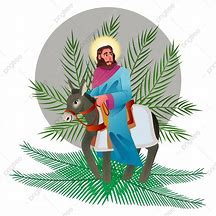Palm Sunday of the Lord's Passion
As we open the readings for Palm Sunday, we realize that unlike any other Mass during the year, there are two gospels, in our liturgy this Sunday. The first gospel recalls the triumphal entrance of Jesus into Jerusalem. This initial scene is of those who have been following Jesus singing the hosannas and the hallelujahs and waving palm branches and laying their cloaks before him as he rode on the donkey into the city. But an interesting thing that the scripture scholars often remind us about, is the fact that Jesus is entering Jerusalem at the same time as when the lambs that will be sacrificed in the Temple for the Passover festival later in the week are entering. Isn’t it interesting that the Lamb of God, Jesus Christ, the anointed one, is entering through the same passageway as those lambs who will be sacrificed later this week for Passover. Passover, that celebration by the Jews to commemorate their being set free by God from their bondage in Egypt and Jesus, the Lamb of God, who enters the city of Jerusalem, and who will free us through his sacrifice from the bondage of sin and separation from God. Next, during the reading of the second gospel, we come to the very long narrative which includes the last supper, the trial of Jesus, and finally the execution of Jesus of Nazareth, King of the Jews (John 19:19-21). In this narrative gospel everything seems to become topsy-turvy. Everything and everyone seem to be turned upside down. It begins with Jesus who enters with praises of “Hosanna to the Son of David,” (Matthew 21:9) on the lips of the crowd on Palm Sunday, and a mere five days later another crowd will call for Jesus to be crucified as a criminal on Good Friday. At the last supper Jesus offers wine and bread to become his body and blood for the salvation of the world, but all the apostles who gather around him can do is to argue with one another about who is the most important, who is to be considered the greatest among the apostles. One can wonder are they even listening to the words of Jesus? The question scripture ask of us how well are we are listening to Jesus? Jesus encourages Peter to be strong because he will need to help his brothers after the crucifixion when their hopes and dreams will seem dashed to the ground. Peter replies that that he will never allow Jesus to be hurt or killed even if he himself must die for Jesus. However, that promise of Peter fades into silence when he tested later. In fact, the opposite happens, denial issues from Peter’s lips when he is challenged about his relationship to Jesus. Scripture asks of us again, when we are challenged either by ourselves or others on how faithful we are being in following Jesus what are our responses like? Are they ever at all like Peter's? In the garden of Gethsemane, he who healed the lepers, he who brought sight to the blind, he who raised up those who were crippled, is now subjected himself to agony and fear because of the mission that lays before him. That which is also human in him, reaches out to the Father, in anxiety and fear, asking if it possible for this cup of suffering to be removed. But that which is divine within him accepts that the Father’s will is primary, and that God’s way will lead to life everlasting, even though what is seen by all is only death. And even in the crucifixion scene itself, everything is turned upside down it seems. One criminal curses Jesus, while the other criminal, gets who Jesus truly is, and who in the last moments of his life, a life of dissolution and sin, and like the prodigal son, asks for forgiveness. He asks Jesus, the innocent one, to remember him when Jesus comes into his kingdom. And with that simple request, he enters heaven with Jesus. Also on that day on Golgotha the leaders of temple and others taunt Jesus saying, “if you are the Son of God come down from the cross and we will believe..." (Matthew 27:39-43). And yet even the pagan centurion who stands at the foot of Jesus’ cross realizes who Jesus is and professes “truly he was the Son of God” (Matthew 24:54). So, as we enter this most sacred of weeks, we are asked also to think about our own role as followers of Jesus. Perhaps as we enter into this holiest of weeks, our own lives having been turned upside down either by illness, or by death of a loved one, or by some tragedy that we never expected that has befallen us. And yet, even in the midst of that darkness which we may be enduring, the light of Christ suffering can shine on us, like it did for the good thief, like it did for the pagan centurion, and we too can realize again in a personal way who Jesus truly is for us. What is it that we would ask of Jesus this week as we remember Palm Sunday, or the words with which he spoke to his apostles in the last supper, or his suffering of Good Friday? These moments that we celebrate this week, are all preludes to the coming of the Christ, the anointed one, who rises triumphant over death on Easter morning. The anointed one who touches all souls that are open to Him and who calls us to sing out: Jesus Christ, King of the Universe, hear our prayer.


